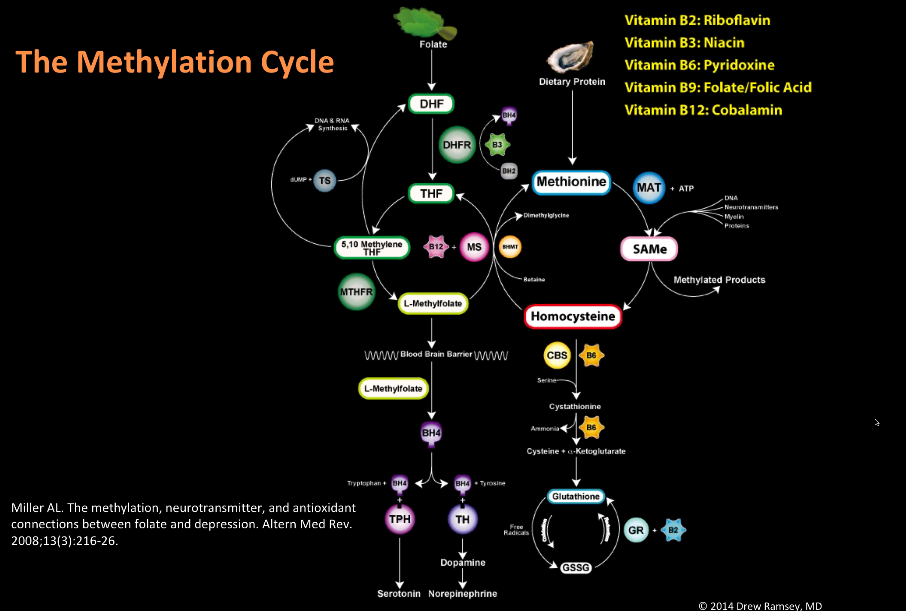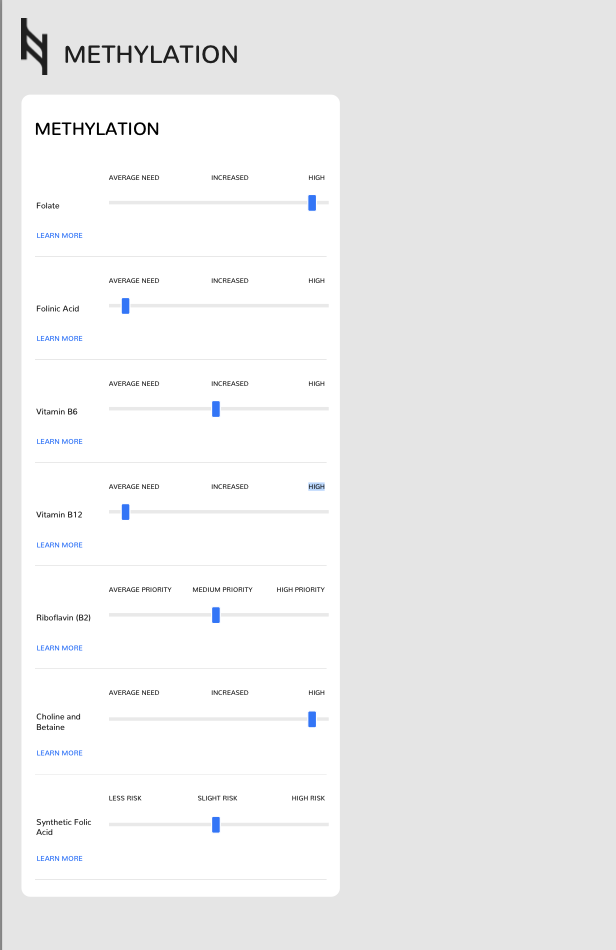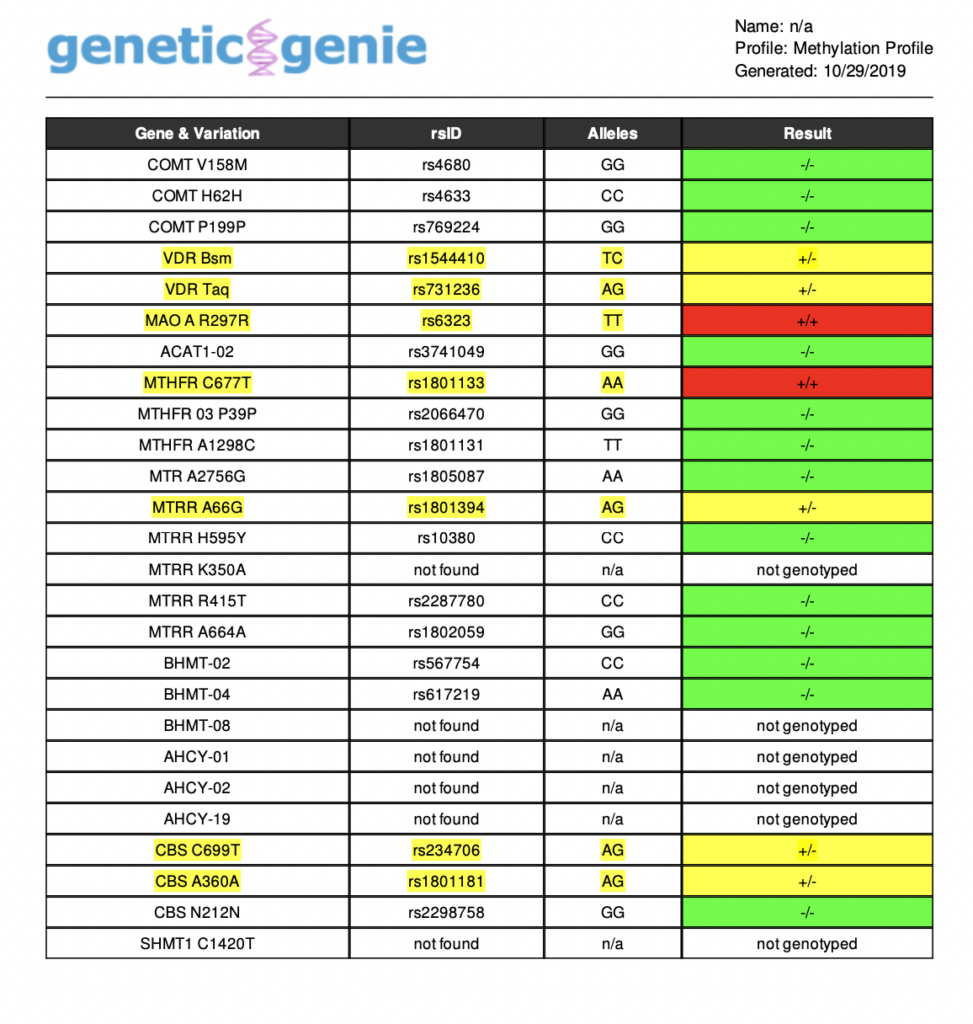Unlocking the Power of Methylation
July 2, 2024
Methylation is a foundation of epigenetics and plays a pivotal role within our health. And when dysfunctional, methylation can be influential in MS, ADD, ADHD, cancers, addiction, chronic fatigue, infertility, depression, Parkinson’s, and even Alzheimers. There are methylation markers, which are essentially red flags that sit on our genes and either block or allow access to our genes, that influence their expression. When our DNA/RNA expression is altered in this way, it often leads to chronic diseases (including cancer), neurotransmitter imbalances can occur, and the body’s inherent detoxification processes are impaired, which leads to the buildup of toxic metabolites and the accumulation of environmental toxins (such as heavy metals).
Let’s dive into what methylation actually is, the genetics involved, top foods you can eat to support methylation, its connection to epigenetics, and how methylation can help heal trauma and anxiety.
What is Methylation
Methylation is a crucial biochemical process that involves the addition of a methyl group to DNA, proteins, and other molecules. This modification plays a significant role in regulating gene expression, maintaining genome stability, and ensuring proper cellular function. In DNA, methylation typically occurs at cytosine bases and can influence whether genes are turned up or down, affecting various biological processes and development. This seemingly simple process is essential for many bodily functions, including DNA repair, gene expression, detoxification, and neurotransmitter production. And when dysfunctional, methylation can be influential in MS, ADD, ADHD, cancers, addiction, chronic fatigue, infertility, depression, Parkinson’s, and even Alzheimers. There are methylation markers, which are essentially red flags that sit on our genes and either block or allow access to our genes, that influence their expression. Methylation is a cornerstone of cellular function and overall health, influencing everything from energy production to mood regulation. Take a look at the image below to help get a better understanding of the methylation cycle and where those nutrients come into play.

The Genetics of Methylation
The efficiency and effectiveness of methylation can be influenced by genetic factors. Certain genes, like MTHFR (methylenetetrahydrofolate reductase), play a crucial role in the methylation cycle. Variants or mutations in these genes can lead to impaired methylation processes. For instance, individuals with MTHFR mutations may have difficulty converting folic acid to its active form, leading to potential deficiencies and related health issues.
Other genes involved in the methylation process include MTR (methionine synthase), MTRR (methionine synthase reductase), and COMT (catechol-O-methyltransferase). These genes contribute to various aspects of the methylation cycle, and their functionality can significantly impact an individual’s methylation efficiency.
Genetic testing is a great way to determine how your methylation is functioning and if you have any of the genes that I mentioned above that could impact your body’s methylation efficiency. One of my favorite genetic tests is by Nutrition Genome. The below image is a screenshot from their genetic test that shows

Another great one is Genetic Genie, where you can input your 23andMe data into it to get methylation or detox reports to have a practitioner interpret. Here is an example of what that report looks like!

Epigenetics and Methylation
Methylation is a key player in epigenetic regulation. Epigenetics refers to changes in gene expression that do not involve alterations to the underlying DNA sequence. DNA methylation involves the addition of methyl groups to the DNA molecule, typically at cytosine bases. This modification can turn genes up or down, influencing a wide range of biological processes.
Epigenetic changes, including DNA methylation, can be influenced by various factors such as diet, lifestyle, and environmental exposures. For instance, low nutrients, trauma, social isolation, chronic stress or exposure to toxins can lead to aberrant methylation patterns, potentially contributing to various health issues, including cancer, cardiovascular diseases, and neurological disorders.
We are MOST susceptible to epigenetic changes to our DNA during transitional times during our lives like puberty, menopause, and pregnancy. Here is just one example of how this is possible. While in utero, the baby is extra sensitive to the red flags (methylation markers). A mother’s poor diet (high processed foods, sugars, simple carbs, high glycemic foods, etc) can impact the way the baby regulates blood sugar and handles metabolism the rest of their lives! The baby’s DNA doesn’t change, but the way that it functions does. And we have the power to help or hurt that expression… and food is one of the most impactful tools we have.
Top Foods for Methylation
Nutrition plays a vital role in supporting healthy methylation. Certain foods are particularly rich in nutrients that support the methylation cycle, such as folate, vitamin B6, vitamin B12, and betaine. Here are some top foods to include in your diet:
- Leafy Greens: Spinach, kale, and other dark leafy greens are high in natural folate, a key nutrient for methylation. Two cruciferous/day is my golden rule… frozen cauliflower to my smoothie or arugula with eggs and a second one like broccoli at dinner
- Beets: Rich in betaine, beets support the conversion of homocysteine to methionine, aiding methylation. I love to buy them steamed or enjoy in a juice.
- Eggs: Eggs, particularly the yolks, are excellent sources of vitamin B12 and choline, both essential for methylation.
- Legumes: Beans, lentils, and chickpeas provide significant amounts of folate.
- Nuts and Seeds: Almonds, sunflower seeds, and flaxseeds contain important methylation-supporting nutrients.
- Seafood: Fish such as salmon and trout are excellent sources of vitamin B12 and omega-3 fatty acids, which also support methylation.
- Dark Berries: The phytonutrients present in berries are epigenetically active, making them potent methylation adaptogens.
- Shitake: Mushrooms, particular shiitake mushrooms, are considered methylation adaptogens and they are rich in choline, vitamin B5, niacin, riboflavin, vitamin B6 and vitamin B12. I love a butter fried mushroom as a side dish
- Rosemary: This popular herb contains folate and is considered a methylation adaptogen because it has been shown to regulate DNMT. I love this herb dried, fresh, infused in olive oils or used to marinate meat before BBQ to protect from cancer causing chemicals.
- Turmeric: Turmeric contains curcumin, which helps to support the antioxidant system, a healthy stress response, and plays a role in methylation biochemistry. I love to enjoy turmeric in a latte, in a muffin, anyway is a golden way!
Methylation, Trauma, and Anxiety
Methylation also plays a significant role in mental health, particularly in how we heal from trauma and how we manage anxiety. The process of methylation affects the production and regulation of neurotransmitters, which are critical for mood regulation and cognitive function.
- Healing from Trauma: Trauma can lead to lasting changes in DNA methylation patterns, particularly in genes related to stress response and emotional regulation. Proper methylation is essential for the synthesis of neurotransmitters like serotonin, dopamine, and norepinephrine, which are crucial for recovery from trauma. Supporting methylation through diet and lifestyle can aid in the restoration of normal neurotransmitter levels, facilitating the healing process.
- Managing Anxiety: Anxiety disorders have been linked to dysregulated methylation patterns. For example, hypermethylation of the serotonin transporter gene can reduce serotonin availability, contributing to anxiety. Ensuring adequate methylation support through nutrition and possibly supplementation can help maintain balanced neurotransmitter levels, thereby reducing anxiety symptoms.
Learned behavioral traits, inherited patterns, generational trauma and our own thoughts, emotions, and trauma are stored on our epigenome and have an influence over the way our genes are expressed. These markers can turn UP our inflammatory genes and DOWN our immunity genes.
We can support healing by addressing specific genes, nutrients required for methylation, and utilizing calming modalities like meditation which can all help heal our epigenome and ourselves from trauma.
Holistic Strategies to Support Methylation
Methylation is a foundational process that influences numerous aspects of our health, from genetic expression to mental well-being. By understanding the genetics involved, supporting methylation through nutrition, and adopting holistic lifestyle practices, we can enhance our overall health and resilience. Whether healing from trauma or managing anxiety, a focus on methylation can be a powerful tool in our holistic health toolkit.
Schedule a free discovery call with me today so we can get you started on the right path to healing and better health.